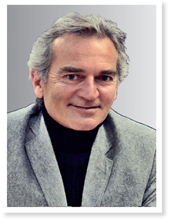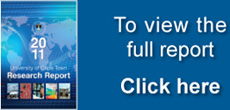Research Contracts and Intellectual Property Services Office
 This was another exciting year for the Research Contracts and Intellectual Property Services Office, which has seen externally funded research agreements reaching new highs in terms of volume (up by 31 percent to 1 360 contracts) and value (up by 29 percent to R722 million). The value of contracts entered into with foreign entities was R438,62 million for 2011 (compared to R382.5 million in 2010 and R334,7 million in 2009).
This was another exciting year for the Research Contracts and Intellectual Property Services Office, which has seen externally funded research agreements reaching new highs in terms of volume (up by 31 percent to 1 360 contracts) and value (up by 29 percent to R722 million). The value of contracts entered into with foreign entities was R438,62 million for 2011 (compared to R382.5 million in 2010 and R334,7 million in 2009).
This all happened against the backdrop of the implementation of the Intellectual Property Rights from Publicly Financed Research and Development Act (IPR Act), which has impacted significantly on the time required to negotiate both research and commercialisation contracts, with the need to educate external parties on its terms and the new requirements.
We have also seen the highest-ever annual invention disclosures (36) and outbound license agreements (13), as well as the establishment of three new spinoff companies, indicating increased activity across the innovation continuum. Our inventors have also received recognition, locally and abroad. Dr George Vicatos of the Mechanical Engineering Department was named the Inventor of the Year by Popular Mechanics in its inaugural recognition of South African inventors. The Department of Physics’ NanoSciences Innovation Centre and their spinoff nanotechnology company, PST Sensors, scooped the Printed Electronics USA Best in Show Award at the 2011 Printed Electronics USA Conference in Silicon Valley. This is their second major award, following on the heels of their 2010 Printed Electronics Europe Academic R&D Award.
This year, we decided to produce a concise brochure to showcase innovation at UCT, augmenting the more comprehensive publication produced in 2010. The comprehensive publication will be published less frequently and brochures of this type will now be produced annually to raise the profile of UCT’s innovations, both internally as well as to external stakeholders.
It is, however, still the case that many UCT innovations with huge social and commercial promise never get off the ground because of a lack of both seed funding and the managerial and mentoring skills needed to birth new spin-off companies. We have launched two new initiatives to address these problems. Through the Alumni and Friends Innovation Network, we call on individuals to donate a portion of their time and/or expertise to further innovation at UCT. The contributions can be in the form of knowledge or contacts in the market place, the evaluation of technologies, or mentoring and guidance to spin-off enterprises. Supporters could even consider acting as a chief executive officer or a director of a company (more information can be found at: www.rcips. uct.ac.za/fundinnov/alumni_friends/).
The Evergreen Fund initiative builds on the existing foundation of the UCT Pre-Seed Fund, with the objective of assisting the successful translation of good technology into good business. The fund will differ from the Pre-Seed Fund in the sense that the investments will be larger (between R500,000 and R1,5 million each) and a level of return will need to be made to the Evergreen Fund. The funding will support technology development, or be used to get spin-off companies off the ground, but will be considered to be loans, rather than direct grants. The idea is that, once the company is established, the seed money will be refunded to replenish the fund in order to support other technologies and/or companies. We hope to raise a minimum of R10 million. To date, we have R2 million that has accumulated from a donation of approximately R500,000 made by Richard Sonnenberg in the late 1980s for technology transfer activities.
Another highlight was the approval of our new Intellectual Property Policy by the National Intellectual Property Management Office. While many of the changes in the IP Policy were necessary because of the Intellectual Property Rights Act that influences the way in which UCT manages its IP, it was also an opportunity to clarify some grey areas and to bring it up to date in terms of new intellectual property developments relating to aspects such as Open Source and Creative Commons. In this regard, it is worth noting that UCT has adopted Open Source as the default for research and teaching related to software development and under the innovation section of this report, we describe how open sourcing has assisted a UCT research team in developing a mobile phone application that enables users of low-cost phones to submit water quality results quickly and easily.

This all happened against the backdrop of the implementation of the Intellectual Property Rights from Publicly Financed Research and Development Act (IPR Act), which has impacted significantly on the time required to negotiate both research and commercialisation contracts, with the need to educate external parties on its terms and the new requirements.
We have also seen the highest-ever annual invention disclosures (36) and outbound license agreements (13), as well as the establishment of three new spinoff companies, indicating increased activity across the innovation continuum. Our inventors have also received recognition, locally and abroad. Dr George Vicatos of the Mechanical Engineering Department was named the Inventor of the Year by Popular Mechanics in its inaugural recognition of South African inventors. The Department of Physics’ NanoSciences Innovation Centre and their spinoff nanotechnology company, PST Sensors, scooped the Printed Electronics USA Best in Show Award at the 2011 Printed Electronics USA Conference in Silicon Valley. This is their second major award, following on the heels of their 2010 Printed Electronics Europe Academic R&D Award.
This year, we decided to produce a concise brochure to showcase innovation at UCT, augmenting the more comprehensive publication produced in 2010. The comprehensive publication will be published less frequently and brochures of this type will now be produced annually to raise the profile of UCT’s innovations, both internally as well as to external stakeholders.
It is, however, still the case that many UCT innovations with huge social and commercial promise never get off the ground because of a lack of both seed funding and the managerial and mentoring skills needed to birth new spin-off companies. We have launched two new initiatives to address these problems. Through the Alumni and Friends Innovation Network, we call on individuals to donate a portion of their time and/or expertise to further innovation at UCT. The contributions can be in the form of knowledge or contacts in the market place, the evaluation of technologies, or mentoring and guidance to spin-off enterprises. Supporters could even consider acting as a chief executive officer or a director of a company (more information can be found at: www.rcips. uct.ac.za/fundinnov/alumni_friends/).
The Evergreen Fund initiative builds on the existing foundation of the UCT Pre-Seed Fund, with the objective of assisting the successful translation of good technology into good business. The fund will differ from the Pre-Seed Fund in the sense that the investments will be larger (between R500,000 and R1,5 million each) and a level of return will need to be made to the Evergreen Fund. The funding will support technology development, or be used to get spin-off companies off the ground, but will be considered to be loans, rather than direct grants. The idea is that, once the company is established, the seed money will be refunded to replenish the fund in order to support other technologies and/or companies. We hope to raise a minimum of R10 million. To date, we have R2 million that has accumulated from a donation of approximately R500,000 made by Richard Sonnenberg in the late 1980s for technology transfer activities.
Another highlight was the approval of our new Intellectual Property Policy by the National Intellectual Property Management Office. While many of the changes in the IP Policy were necessary because of the Intellectual Property Rights Act that influences the way in which UCT manages its IP, it was also an opportunity to clarify some grey areas and to bring it up to date in terms of new intellectual property developments relating to aspects such as Open Source and Creative Commons. In this regard, it is worth noting that UCT has adopted Open Source as the default for research and teaching related to software development and under the innovation section of this report, we describe how open sourcing has assisted a UCT research team in developing a mobile phone application that enables users of low-cost phones to submit water quality results quickly and easily.


